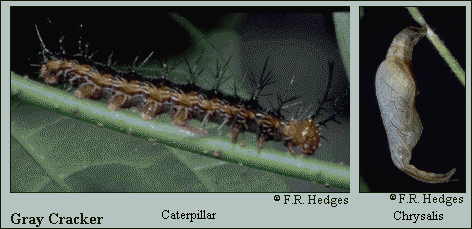 |
 

 |



Gray Cracker (Hamadryas februa [Hübner])
Wing span: 2 3/4 - 3 3/8 inches (7 - 8.6 cm).
Identification: Upperside is mottled brown and white; forewing cell bar with some red; hindwing eyespots have orange scales before the black crescents. Underside of hindwing is white; submarginal eyespots are composed of a brown ring around a black crescent in a white center.
Life history: Adults rest on tree trunks head downward with their wings spread open. Males perch on trees and make a cracking sound when they dart out at passing insects (and people). Eggs are laid singly under leaves or sepals of the host plant; caterpillars are solitary and build resting platforms out of dung pellets. Before dark, adults gather on a single tree, then disperse to roost in nearby trees or shrubs.
Flight: Many flights; throughout the year in the tropics, August-October in South Texas.
Caterpillar hosts: Vines (Dalechampia) and herbs (Tragia) in the family Euphorbiaceae.
Adult food: Sap and rotting fruit.
Habitat: Subtropical forest and edges, cultivated areas with trees.
Range: Argentina north through tropical America to Mexico. A rare stray to the lower Rio Grande Valley of South Texas.
Conservation: Not required for a rare stray.
The Nature Conservancy Global Rank: G5 - Demonstrably secure globally, though it may be quite rare in parts of its range, especially at the periphery.
Management needs: None reported.
References:
DeVries, P. J. 1987. The butterflies of Costa Rica and their natural history.
Papilionidae, Pieridae, Nymphalidae. Princeton University Press, Princeton,
New Jersey. 327 pages,50 color plates.
Opler, P. A. and V. Malikul. 1992. A field guide to eastern butterflies. Peterson
field guide #4. Houghton-Mifflin Co., Boston. 396 pages, 48 color plates.
Scott, J. A. 1986. The butterflies of North America. Stanford University Press,
Stanford, Calif. 583 pages, 64 color plates.
Author: Jane M. Struttmann

